
Ethiopia's Prime Minister Abiy Ahmed. /AP
Ethiopia's Prime Minister Abiy Ahmed. /AP
Ethiopia said on Wednesday it had begun military operations in the Tigray region, after the prime minister accused the local government of attacking federal troops.
In September, Tigray held regional elections in defiance of the federal government, which called the vote "illegal." The row has escalated in recent days with both sides accusing each other of plotting a military conflict.
Military operations in the region had commenced, Prime Minister Abiy Ahmed's spokeswoman Billene Seyoum told media, without giving further details.
The federal government declared a six-month state of emergency in Tigray region to be overseen by a team led by the chief of staff of the armed forces, the prime minister's office said.
"The last red line has been crossed with this morning's attacks and the federal government is therefore forced into a military confrontation," a statement said, adding that its aim was to prevent instability engulfing the country and region.

A woman making her way with a child in the Tigray region. /AFP
A woman making her way with a child in the Tigray region. /AFP
Tigray's local government said the Northern Command of the federal military, which is stationed in the region, had defected to its side. Billene dismissed the claim as "false information."
Internet access monitor NetBlocks said the internet had been shut down in the region, confirming reports that authorities had shut down telephone and internet services.
Tigrayans ruled Ethiopian politics since guerrilla fighters ousted a Marxist dictator in 1991, but their influence has waned under Abiy. Last year, the TPLF quit his ruling coalition.
Since Abiy came to power in 2018, many senior Tigrayan officials have been detained, fired or sidelined, in what the federal government describes as a clamp-down on corruption but Tigrayans see as a means to quell dissent.
Tigray's population makes up 5 percent of Ethiopia's 109 million people, but it is wealthier and more influential than many other, larger regions.
Source(s): Reuters